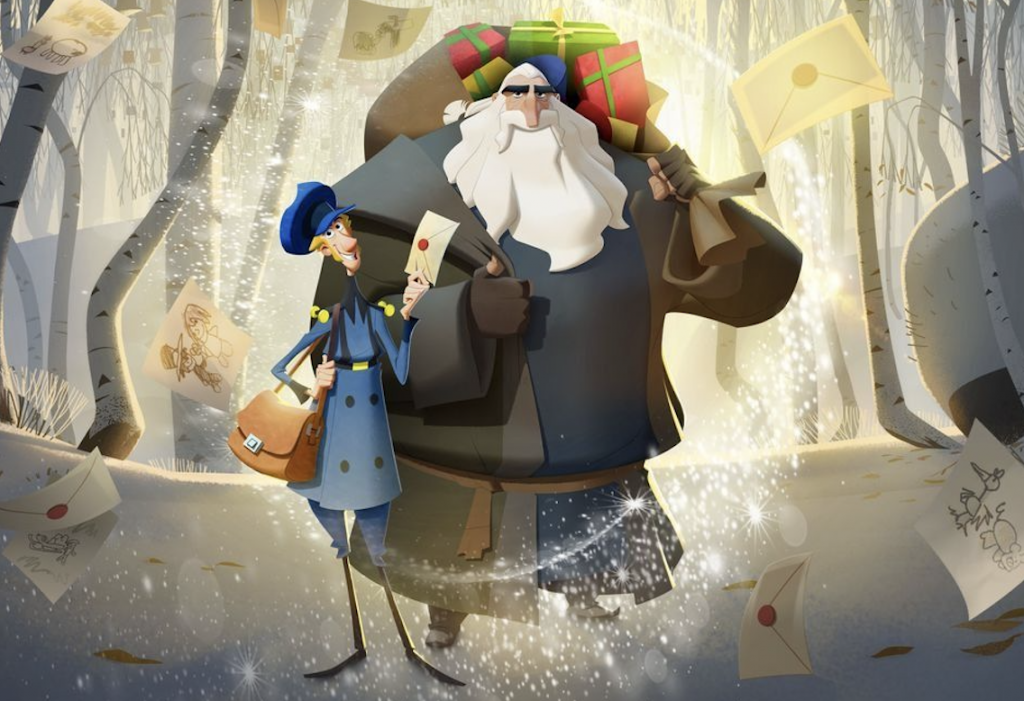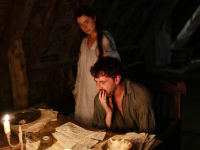 Not only one of the best original Netflix films of 2019, Klaus has been hailed as one of the best Christmas films ever, earning it an Oscar nomination and cult status amongst its many fans. But what made it so special?… let’s rewind!
Not only one of the best original Netflix films of 2019, Klaus has been hailed as one of the best Christmas films ever, earning it an Oscar nomination and cult status amongst its many fans. But what made it so special?… let’s rewind!
Original films created for streaming platforms are nothing new and can sometimes be a little hit or miss. It’s certainly encouraging to see filmmakers use a platform which isn’t going away anytime soon, to release films that 20 years ago would’ve been enough of a reason to visit your local cinema. And Klaus certainly feels that way from the outset.
The tone of the film at first deceptively evokes a period in animation history from the early 2000’s. Back when people were becoming tired of the musical aspects and fairy tales tropes of Disney’s 90’s work, pushing studios to go for more experimental and offbeat storytelling. This paved the way for some truly interesting offerings such as ‘Lilo & Stitch’, ‘The Emperor’s New Groove’, ‘Atlantis’ and ‘Treasure Planet’. Some more critically acclaimed than others, but all truly original in their look and tone. Klaus certainly shares a lot of those aspects with those unique films, but it also pushes the art form so much further.
Directed by veteran animator Sergio Pablos from his new animation studio SPA, Klaus takes place in 19th-century Norway and follows the story of Jesper Johansen (Jason Schwartzman) the lazy, spoiled son of the Postmaster General, who is fed-up with his son deliberately underperforming in his (comically militant) postman training. In a last-ditch effort to teach him some responsibility, he ships him off to the distant town of Smeerensburg, with the challenge of delivering 6,000 letters within a year or he’ll be cut off from the family’s money.
Upon arriving in bleak and cold Smeerensburg, it becomes quickly apparent that the warring residents of the town have no interest in sending each other letters. That is until Jesper crosses paths with Klaus (J.K Simmons), an imposing old woodsman/carpenter living alone deep in the forest. Jesper runs away but drops a drawing by one of the children of the town. Seeing it, Klaus takes the drawing back to Jesper and in the process leaves the child who drew it a wooden toy (see where this going?). Realising this, Jesper sets out to convince the children of the town that if you send Klaus a letter, you’ll be rewarded with gifts, and thus the children slowly begin to believe… and behave. This inspires acts of kindness in the children and in turn, their parents.
It’s a clever retelling of the Santa Claus myth that draws upon themes of loneliness and anger, but ultimately love and redemption. As the backstories of characters like Klaus and others like Alva (Rashida Jones playing a bitter schoolteacher who gave up on teaching a long time ago) are revealed, Jesper’s initial selfish mission, becomes one of selflessness, as he slowly discovers he’s changing people’s lives in a way he never thought he could.
Naturally, they cover all of the bases when it comes to other myths surrounding Santa… why he got his sleigh, who helps him make the presents, etc, but it never feels contrived. There’s the inevitable “But let me explain” moment when folks find out Jesper’s true intentions, but it doesn’t last long and the story picks right back up, and Jesper’s emotional beats never feel unearned. It’s also very funny, with typical cartoonish slapstick and sight gags aplenty, but the voice acting and direction is also top notch. The real star of this film though, are the visuals… which are for lack of a better word… stunning.
A huge part of the film’s appeal came from a revolutionary new animation process whereby the traditional 2D animation has been given some of the more realistic properties of 3D computer animation. The way the character’s are lit, their shadows and textures (all digital) combine to create a kind of ‘2.5D’ quality to the film. Director Pablos was smart taking this approach, as instead of just having traditional 2D animation interacting with 3D environments, the mixture of the art forms creates a wholly unique visual experience. A nostalgic feeling of watching that early 90s/2000s style, whilst at the same time, being undeniably modern.
Coming in at a tight 97 minutes, it’s very well paced and doesn’t outstay it’s welcome. Yeah there are story & character beats in there that you’ve seen a million times, but they’re executed to such a high degree that Klaus will be a family favourite at Christmas time for years to come. The film went on to earn an Oscar nomination and also won a Bafta for best animated feature. Klaus is still available on Netflix and I imagine it will be for quite a while, so why not settle in for a cosy festive winter evening, and enjoy this gem of a film.







